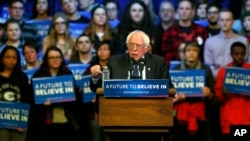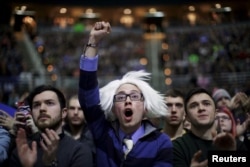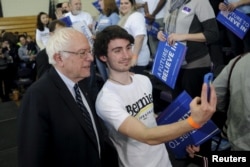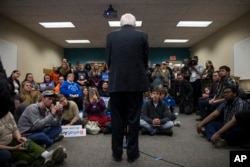If you go to just about any Bernie Sanders rally these days, you’ll feel it right away: the 74-year-old Vermont senator is really popular with young people.
With his grumpy, plain-speaking demeanor and scraggly patch of white hair, the Democratic presidential candidate has somewhat improbably attracted huge crowds of energetic young progressives to his campaign events.
They come to hear Sanders essentially give the same speech every time: He says public colleges should be free. He calls for a single-payer, universal health care system. He wants the minimum wage doubled. He’ll break up the big banks.
The proposals are all part of what the Sanders calls a “political revolution,” a self-described democratic socialist vision that in many ways would fundamentally restructure how the U.S. federal government relates to its people.
Sanders' campaign also provides a stark contrast, both in terms of policy and approach, to that of his rival, former secretary of state Hillary Clinton.
Sanders dominating youth vote
Clinton, who generally takes more centrist Democratic views, has a large delegate lead and likely will emerge as the Democratic nominee.
But it doesn’t take much digging into polling data to find a clear trend: young Democrats, especially those in the millennial generation, prefer Sanders to Clinton.
And it’s not even close.
For months, Sanders’ support among 18-29-year-olds nationwide has hovered around 70 percent, compared to about 30 percent for Clinton, according to Reuters polling data.
His dominance of the youth demographic was on display once again in the latest state to hold a primary, Wisconsin, which he won with the help of a stunning 82 percent of those in the 18-29 year old age bracket, according to exit polls.
That's a pretty typical result for Sanders in most states this primary season.
The septuagenarian senator even has dominated the youth vote in states Clinton has won. In Florida, for example, which Clinton took in a landslide last month, young Democrats supported Sanders over Clinton by a margin of 64 to 35 percent.
Democratic Socialism: the future?
Sanders’ extreme popularity with youth voters raises the question: do his democratic socialist ideas represent the future of the Democratic Party?
One of the most prominent figures in America’s political left, Noam Chomsky, thinks that’s very possible. He says the rise of Sanders represents a return to the Democratic Party of the middle 20th century, which was far more liberal than the party is today.
“His campaign has, so far, restored some of the concerns and aspirations of the reformist New Deal Period,” Chomsky told VOA in an email.
Chomsky, who identifies as a libertarian socialist, was referring to the “New Deal” domestic relief programs put in place in the 1930s by then-President Franklin D. Roosevelt. The New Deal, a response to the Great Depression, helped bring about many government welfare programs, including the Social Security safety net for seniors, which is widely popular with voters across the political spectrum.
There is still support for expanding such programs, says Chomsky, but he is reluctant to predict that Sanders' rise means there will be an organized democratic socialist wing within the party anytime soon.
Will the Democratic Socialist trend last?
Others argue that many of Sanders’ young supporters will become more moderate, mainstream Democrats as they get older, and eventually reject the more fringe, “socialist” views of their youth.
But there's not actually much evidence to suggest that's the case, says John Sides, a political science professor at George Washington University.
“Instead, political attitudes mostly tend to harden over the lifespan,” says Sides. “The aging process is mainly reinforcing your views, not moving them in any particular ideological direction.”
David Sears, who studies political psychology at the University of California, Los Angeles, agrees. "The 'aging produces conservatism' idea is pretty widespread," he told VOA. "But I don't know that there is a lot of positive evidence for it."
Sears says political attitudes are determined in large part by the popularity of whoever the president is when voters reach their late teens and early 20s.
In this case, that would be Barack Obama, whose popularity has continued to rise as he prepares to leave office in January. As a result, "the young Bernie supporters are likely to look unusually progressive when they are 50," concludes Sears.
So does that settle it? Will the Democratic presidential nominee 30 years from now look something like Bernie Sanders and espouse his democratic socialist ideas?
Ideology or character?
Will Marshall, who heads the Progressive Policy Institute, a research organization that represents more centrist liberal views, doubts that will be the case. He points out that many young Democrats are attracted to Sanders for non-ideological reasons.
“Some of them clearly are [motivated by Sanders’ political views], but I don’t think that explains the extraordinarily large margins he’s rolled up with millennial voters,” Marshall says. “What Bernie offers is authenticity, simplicity, principles, clarity – things that people who are deeply estranged from traditional politics are interested in."
Sanders’ perceived trustworthiness does seem to be a major factor for many of his supporters, according to polling data. In Tuesday’s exit polls in Wisconsin, 82 percent of Democratic voters said Sanders is more honest and trustworthy than Clinton. And most voters ranked honesty and trustworthiness as their most important concern.
Economic concerns
Another reason young voters may be attracted to Sanders is that they are often the most affected by a sluggish economy.
Sanders has tailored his campaign to appeal to college students and recent graduates who are saddled with massive student loan debt or who have had difficulties entering the job market.
If those economic concerns were to be addressed, would there still be such an appetite among young voters for European-style social welfare programs?
Marshall says no. He predicts that an economy strengthened through more traditional liberal market policies will “restore the normal balances of American politics.”
Anti-establishment sentiment
The uniqueness of Sanders' political views, especially during an election that has been dominated by anti-establishment sentiment, may actually be another factor driving his popularity, according to some analysts.
No self-described "socialist" presidential candidate has ever had this much success in a U.S. presidential election. Could that actually be one of the things that is actually making him more attractive?
According to Peter Hart of the Hart Research organization, many young voters may be for Sanders simply because he represents something they've never tried before.
“There’s a willingness to look at what’s going on in America and say, ‘We need to change. We’re unhappy with the status quo. We don’t necessarily know the answer, but we’re willing to look around for solutions,'” Hart says.
Unrealistic expectations
But what happens if Sanders loses his bid for the Democratic presidential nomination? Will his supporters, who have become energized to enter the political process, once again find themselves burned out and disappointed?
Garry South, a veteran Democratic strategist, says that's the danger of building up "unrealistic expectations."
"It's an attractive pitch to millennials, and they're buying into it with a great deal of enthusiasm. But it's not going to happen," South insists. "We're not going to have free college for all. It's never going to happen."
"And at the end of the day, when you try to be a 'Pied Piper' and then you don't lead everyone to the promised land, there's a disillusionment that sets in," he adds.
Sanders has repeatedly stressed that his campaign has been about more than just trying to get him elected president. Instead, he says, it is about building a movement for social change.
Many of Sanders' most loyal devotees are getting that message, according to Ken Quam, a 32-year-old database administrator who helped form a grassroots volunteer organization supporting Sanders in the Washington, D.C. area.
"The message is being heard, and people know we need to stay involved and continue to be involved in the political process after the election," Quam told VOA. "If Sanders loses, I'm just going to keep doing what I've been doing."







